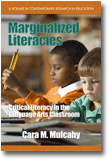
Marginalized Literacies
Critical Literacy in the Language Arts Classroom
By:
Cara M Mulcahy, Central Connecticut State University
A volume in the series: Contemporary Research in Education. Editor(s): Terry Osborn, University of South Florida.
Published 2010
Functional literacy, cultural literacy, and progressive literacy are just a few of the many terms one can invoke when attempting to define literacy. From a critical perspective, for a democratic society to exist, a critical literacy is of crucial importance. Critical literacy aims to empower individuals and transform society. It is grounded in critical theory and, like critical pedagogy, investigates ways in which social, cultural, racial, sexual, and economic inequalities are reproduced. By investigating the ideological, political, and social structures that perpetuate such inequalities, it hopes to raise consciousness and move towards creating a more socially just society.
This book examines the approaches set forth by Atwell, Calkins, and Rief in their books, In the Middle (1998); The Art of Teaching Writing (1994); and Seeking Diversity (1992), respectively. This book is of relevance to teacher educators and English Language Arts teachers. It enables one to become familiar with the main components of the Readers’/Writers’ workshop and develop an awareness of how literacy may be conceptualized and reconceptualized through this approach. Teacher educators will find this text useful for raising preservice teachers’ awareness of the ideologies that inform literacy education and in developing their understanding for how students are positioned socially, culturally, politically and economically by such ideologies. English Language Arts teachers will find this book informative in understanding how they can be positioned by teacher texts to teach towards certain ideologies of literacy. Finally, it allows teacher educators and English Language Arts teachers to consider what kind of literacy education is provided for through the Readers’/Writers’ workshop, and whether space may be negotiated within the Readers’/Writers’ workshop, for the teaching of critical literacy.
CONTENTS
Introduction. Chapter 1: Navigating the Literacy Landscape. Chapter 2: Engagement and Self-Discovery: A Workshop Approach. Chapter 3: Pedagogical Paradigms: The Teacher-Student Power Relationship. Chapter 4: Awareness and Inquiry. Chapter 5: Critical Literacy and the Writers’/Readers’ Workshop. Appendix A. Appendix B.
REVIEWS
"Introducing critical literacy in a more specific and emphatic manner purports to better prepare students to evaluate sources, analyze issues, and draw better-informed conclusions. This text becomes a helpful resource to teachers in demonstrating the aspects of each workshop approach that falls short of critical inquiry and in recommending how best to enable students to become more socially aware and active." Patricia A. Gross University of Scranton in Education Review (Read full review)
-
Paperback978-1-60752-454-0
Web price: $45.04 (Reg. 52.99)
-
Hardcover978-1-60752-455-7
Web price: $80.74 (Reg. 94.99)
- eBook9781607524564

- EDU037000 - EDUCATION: Research
- LAN010000 - LANGUAGE ARTS & DISCIPLINES: Literacy
- EDU010000 - EDUCATION: Elementary
-
 (Re)Envisioning Social Studies Education Research
Current Epistemological and Methodological Expansions, Deconstructions, and Creations
(Re)Envisioning Social Studies Education Research
Current Epistemological and Methodological Expansions, Deconstructions, and Creations
-
 Celluloid Blackboard
Teaching History with Film
Celluloid Blackboard
Teaching History with Film
-
 Comparative Studies in Educational Policy Analysis
Comparative Studies in Educational Policy Analysis
-
 Inquiry in the Classroom
Realities and Opportunities
Inquiry in the Classroom
Realities and Opportunities
-
 Moments that Matter in the Learning and Development of Children
Reflections from Educators
Moments that Matter in the Learning and Development of Children
Reflections from Educators
-
 Normalites
The First Professionally Prepared Teachers in the United States
Normalites
The First Professionally Prepared Teachers in the United States
-
 Transforming Schools
Alternative Perspectives on School Reform
Transforming Schools
Alternative Perspectives on School Reform

